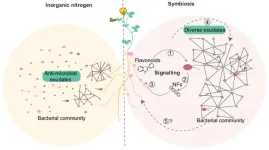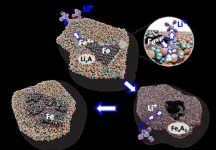Researchers from SWOG Cancer Research Network, a cancer clinical trials group funded by the National Cancer Institute (NCI), part of the National Institutes of Health (NIH), will share results of their work in 30 presentations at the 2024 American Society of Clinical Oncology (ASCO) Annual Meeting, which takes place May 31 – June 4 in Chicago.
The clinical trials reported on in this work are led by SWOG and conducted by the NIH-funded NCI National Clinical Trials Network (NCTN) and the NCI Community Oncology Research Program (NCORP).
“I’m particularly proud of SWOG’s work at ASCO this year,” said Charles D. Blanke, MD, SWOG group chair, “not only because we’re presenting a record number of SWOG-led abstracts, including seven oral presentations, but also because many of those abstracts report the kind of life-changing results that come only from public-powered research – such as more accurate ways of determining which patients can safely skip additional chemotherapy, and how we can reduce some of the devastating side effects patients can experience during and after cancer treatment.”
Here are highlights of some of the SWOG work that will be delivered in oral presentations at the 2024 ASCO Annual Meeting:
Kevin Kalinsky, MD, MS, of Emory University, who led the SWOG S1007 RxPONDER study, will present results from a secondary analysis of pre-treatment blood samples and data from that trial. RxPONDER randomized women with hormone receptor-positive, HER2-negative, 1–3-node-positive breast cancer who had a 21-gene Recurrence Score of 25 or lower. The trial reported that patients saw a benefit from adding chemotherapy to endocrine therapy after surgery depending on their reported menopausal status – premenopausal women benefited from the chemo, while postmenopausal women did not.
Kalinsky will report new findings suggesting that blood level of a specific hormone may be a better indicator than menopausal status. His team measured baseline blood hormone levels in more than 1,000 RxPONDER patients younger than 55 years. They found that the level of one specific hormone – anti-Müllerian hormone (AMH), which reflects ovarian function or reserve – was a better predictor of whether a patient was likely to benefit from adjuvant chemotherapy than the patient’s age, menopausal status, or blood levels of other hormones. If these results are validated, levels of AMH by a blood draw before the start of treatment might help identify which patients in this disease setting are likely to benefit from adjuvant chemotherapy and which can safely forego it. (abstract 505)
Lajos Pusztai, MD, DPhil, of Yale University School of Medicine and chair of SWOG’s breast cancer research committee, will present in Chicago on a new prognostic tool known as RSClin N+. RSClin N+ combines information from the OncotypeDX 21-gene Recurrence Score (RS) assay with clinical and pathologic factors to estimate recurrence risk and predict benefit from adjuvant chemotherapy for premenopausal or postmenopausal patients who have hormone receptor-positive (HR+), HER2-negative breast cancer with 1-3 involved lymph nodes.
The web-based RSClin prognostic tool has been available for several years to estimate recurrence risk and predict chemotherapy benefit in patients with HR+, HER2-negative breast cancer that is node-negative. Working with data from more than 5,000 participants in the SWOG S8814 and S1007 RxPONDER clinical trials, Pusztai’s team in collaboration with researchers at Exact Sciences set out to develop and validate a complementary tool for 1–3-node-positive patients in this disease setting.
In their analysis, RSClin N+ provided more accurate risk assessments and better estimates of chemotherapy benefit than those provided by either the RS alone or the clinical-pathologic factors alone. Validating the RSClin N+ tool with external data confirmed that its risk estimates were prognostic and were concordant with observed risk. (abstract 508)
Jill Hamilton-Reeves, PhD, RD, CSO, a SWOG investigator at the University of Kansas Cancer Center, will present results from the SWOG S1600 trial she led. S1600 was a randomized, double-blind, phase 3 trial that enrolled about 200 patients with bladder carcinoma to test whether a specialized immunonutrition intervention (fortified with L-arginine, omega-3 fatty acids, and dietary nucleotides) could help reduce the rate of postoperative complications in the first 30 days after bladder removal surgery. The study did not find an improvement in any grade of post-operative complications at Day 30 or Day 90. Other outcomes still being evaluated include progression-free and overall survival. Compared to the control arm, fewer patients in the intervention arm have had disease progression or have died, although differences are not yet statistically significant and more follow-up is required. (abstract 4501)
Joseph Unger, PhD, a SWOG biostatistician and a health services researcher with the Fred Hutchinson Cancer Center, will present results of an analysis of the association between patient-reported fatigue before starting cancer treatment and adverse events (side effects). His team analyzed more than 100,000 adverse events in more than 8,000 patients who had participated in 18 SWOG clinical trials, in nine different cancers. They found that the level of fatigue patients reported before starting cancer treatment was highly predictive of subsequent risk of adverse events. There was also strong evidence of a dose response pattern, with the odds of severe, life-threatening, or fatal adverse events increasing as the level of fatigue increased. The researchers suggest patient-reported fatigue at baseline may be an important component in determining a patient’s risk of toxicity and could be a key factor to consider when selecting a course of treatment. They also note fatigue may be a marker for underlying disease processes that make a patient more susceptible to adverse reactions to cancer therapy. (abstract 11015)
Meghna S. Trivedi, MD, MS, of the Columbia University Herbert Irving Comprehensive Cancer Center, will present results from SWOG S1714, a prospective cohort study of more than 1,300 patients with early-stage cancer receiving a taxane-based chemotherapy regimen. The primary objective of S1714 is to develop a model to predict a patient’s risk of developing taxane-induced peripheral neuropathy (TIPN). Taxanes are a class of chemotherapy drugs used to treat a number of cancers, but TIPN – which can present as numbness, tingling, and/or nerve pain in the hands and feet – is a common side effect and can affect a patient’s quality of life and ability to complete treatment.
Among patients enrolled to S1714, 62 percent experienced TIPN within 24 weeks of registration to the study. Trivedi’s team identified a limited set of risk factors that can predict a patient’s risk of developing TIPN and that may help guide patient assessment and treatment decision-making. These risk factors include the use of paclitaxel (vs. docetaxel), stage 2 or 3 cancer (vs. stage 1), taxane treatment for longer than 12 weeks, a select set of comorbidities, and race/ethnicity other than non-Hispanic White or Asian. S1714 patients with three to five of the identified risk factors were almost five times more likely to experience TIPN than patients with no risk factors. (abstract 12005)
Visit the SWOG website for a full list of SWOG research results being presented.
Work reported in abstract 505, led by Dr. Kalinsky, was funded by NIH/NCI grants U10CA180888, U10CA180819, and U24CA196175, and in part by Exact Sciences Corporation (previously Genomic Health, Inc.).
Work reported in abstract 508, led by Dr. Pusztai, was funded by NIH/NCI grants U10CA180888, U10CA180819, and U24CA196175, and in part by Exact Sciences Corporation (previously Genomic Health, Inc.) and The Hope Foundation for Cancer Research.
Work reported in abstract 4501, led by Dr. Hamilton-Reeves, was funded by NIH/NCI grants UG1CA189974, R37CA218118, and P30CA16852.
Work reported in abstract 11015, led by Dr. Unger, was funded by NIH/NCI/DCP grant UG1CA189974.
Work reported in abstract 12005, led by Dr. Trivedi, was funded by NIH/NCI grants UG1CA189974 and R37CA277043 and in part by The Hope Foundation for Cancer Research.
SWOG Cancer Research Network is part of the National Cancer Institute's National Clinical Trials Network and the NCI Community Oncology Research Program and is part of the oldest and largest publicly funded cancer research network in the nation. SWOG has 20,000 members in 45 states and nine other countries who design and conduct clinical trials to improve the lives of people with cancer. SWOG trials have directly led to the approval of 14 cancer drugs, changed more than 100 standards of cancer care, and saved more than 3 million years of human life. Learn more at swog.org, and follow us on Twitter (X) at @SWOG.
References:
Abstract 505: Kalinsky K, Barlow W, Pathak H, Gralow J, Albain K, Hayes D, Lin N, Perez E, Goldstein L, Chia S, Rastogi P, Schott A, Shak S, Tripathy D, Hortobagyi G, Meric-Bernstam F, Sharma P, Pusztai L, Thompson A, Godwin A. Correlation of serum anti-Müllerian hormone (AMH) levels on identification of premenopausal patients (pts) with hormone receptor positive (HR+), HER2-negative, node-positive breast cancer most likely to benefit from adjuvant chemotherapy in SWOG S1007 (RxPONDER). https://meetings.asco.org/abstracts-presentations/231752
Abstract 508: Pusztai L, Hoag J, Albain K, Barlow W, Stemmer S, Meisner A, Hortobagyi G, Shak S, Hayes D, Rae J, Baehner R, Sharma P, Kalinsky K. Development and validation of RSClin N+ tool for hormone receptor-positive (HR+), HER2-negative (HER2-) node-positive breast cancer. https://meetings.asco.org/abstracts-presentations/232431
Abstract 4501: Hamilton-Reeves J, Unger J, Holzbeierlein J, Lew DL, Mark J, Daneshmand S, Kukreja J, Lee E, Tabayoyong W, Hershman D, Fisch M, Henry NL. Effects of Immune-Enhancing Nutrition on Radical Cystectomy Outcomes: Primary Results from the Randomized Phase III Double-Blind Clinical Trial (S1600). https://meetings.asco.org/abstracts-presentations/231760
Abstract 11015: Unger J, Vaidya R, Fisch M, Jones S, Henry NL, Hershman D. Patient-reported fatigue and risk of treatment-related adverse events (AEs) in patients receiving systemic therapy in cancer clinical trials. https://meetings.asco.org/abstracts-presentations/231640
Abstract 12005: Trivedi M, Unger J, Hershman D, Darke A, Hertz D, Brannagan T, Smith S, Schneider B, Irvin W, Hathaway A, Vander Woude A, Gudena V, Cabrera-Galean P, Orsted M, LeBlanc M, Henry NL, Fisch MJ. Risk Prediction Model for Taxane-Induced Peripheral Neuropathy in Patients with Early-Stage Cancer Receiving Taxane Therapy: SWOG S1714 (NCT#03939481). https://meetings.asco.org/abstracts-presentations/232442 END



